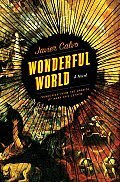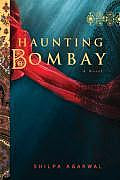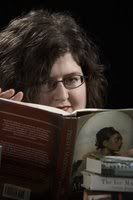We've moved! Come visit us at our very own URL - www.eclecticcloset.ca.
This site blog will remain up for the archives but all future posts will be made at the new site. Please update your bookmarks and come visit us.
Tuesday, June 16, 2009
Tuesday, April 14, 2009
BOOK REVIEW: Wonderful World by Javier Calvo
 "There're always kneecaps that are screaming out, begging for us to shoot them, of course." – Wonderful World
"There're always kneecaps that are screaming out, begging for us to shoot them, of course." – Wonderful WorldThirty years ago, Lorenzo Girault was imprisoned for questionable activities in his antiques business. An undiagnosed pathology, referred to by his family as his "window problem," led Lorenzo to live in rooms without windows and to membership in the "Down with the Sun Society." After Lorenzo's death, his son Lucas struggles to become the man he is sure his father wished him to be. Compelled by a need to understand the legacy left by his father, and determine exactly who was responsible for his father's downfall, Lucas searches for clues in his Lorenzo's secret apartment.
Lucas's quest places him at odds with his mother and in the midst of two gangs in Barcelona's seedy underworld. His best friend is Valentina, a 12-year-old girl who has fashioned herself as Europe's top expert on Stephen King and who indulges in violent fantasies of retribution against her school chums. As Lucas sorts through the detritus of his father's life, Valentina struggles with growing up, while all around them swirls a surreal cast: a giant, comic book obsessed gang enforcer; a strip club owner with a fondness for women's coats; a dreadlock-sporting Russian underling with Rastafarian leanings; and an uptight art dealer for whom thoroughness is next to godliness.
Wonderful World, Javier Calvo’s first novel translated into English, if a film would be David Lynch and Quentin Tarantino’s love child; Lynch for the indescribable plot and Tarantino for the surreal, shocking violence. A feverish verbal joyride, Wonderful World pulls no punches. The quote at the beginning of this review is a typical line of dialogue; rapid-fire and edgy.
At times family drama, mob story, mystery and Hero's journey, Wonderful World is a dizzying, multilayered construction that even includes excerpts from a fictitious Stephen King novel. Calvo's cast is massive and the numerous plot lines almost requires story mapping to keep straight. Yet the quirky characters and chaotic plots are adeptly controlled by this talented author. Not for everyone, Calvo's "open conception of narration" owes much to the Free Cinema movement, developed in the late 1950s and characterized by a deliberate lack of box office appeal.
ISBN10: 0061557684
ISBN13: 9780061557682
Hardcover
480 pages
Publisher: Harper
Publication Date: March 17, 2009
tags: books book reviews literature in translation Javier Calvo
Wednesday, April 01, 2009
BOOK REVIEW: Haunting Bombay by Shilpa Agarwal
 Pinky Mittal grew up in the home of her maternal grandmother Maji, after the death of her mother Yamuna during the violence surrounding the partition of India. Shortly before infant Pinky’s joined the Mittal household, her Aunt Savita lost her infant daughter in a freak accident. The arrival of Pinky is a constant reminder to Savita of what she lost, and she falls more and more into a world of superstitions and secret charms, convinced her daughter’s death was not an accidental drowning but due to wicked spirits. She demands that the children’s bathroom be bolted at dusk in case the evil still lurks within.
Pinky Mittal grew up in the home of her maternal grandmother Maji, after the death of her mother Yamuna during the violence surrounding the partition of India. Shortly before infant Pinky’s joined the Mittal household, her Aunt Savita lost her infant daughter in a freak accident. The arrival of Pinky is a constant reminder to Savita of what she lost, and she falls more and more into a world of superstitions and secret charms, convinced her daughter’s death was not an accidental drowning but due to wicked spirits. She demands that the children’s bathroom be bolted at dusk in case the evil still lurks within.Thirteen years later, Pinky knows she’s despised by her aunt but idolizes her older cousin Nimish, longing for him as young women long for pop or film stars. Everything changes one stifling summer evening when Pinky awakes and discovers Nimish’s secret relationship with Lovely, the beautiful next-door neighbour. In a fit of despair, Pinky unbolts the bathroom door and unleashes the ghosts within. As monsoons batter Bombay, the ghosts unleash chaos on the family and long held secrets are exposed.
Shilpa Agarwal’s debut novel Haunting Bombay is the richly detailed story of a family in crisis. Three generations of the Mittal family live together in a bungalow in 1960s Bombay. Maji, the matriarch, lives by the daily rituals which have governed her life for decades. Savita, slave to her superstitions, is in constant competition with her friends for the “Most-Number-One-First-Class-Life.” Jaginder, Maji’s son, has retreated into an alcoholic stupor rather than face the loss of his daughter.
Agarwal’s ghosts are vengeful spirits, violently exacting payment for the wrongs perpetrated upon them in life. The Mittal family, by refusing to face the tragedy in their midst, have kept Chakori’s sprit from the afterlife and have existed in a purgatory of their own making. And hidden within Haunting Bombay are deeper secrets, ones which Agarwal slowly unfurls one by one and ones that help readers understand the mysteries of this ancient culture.
ISBN10: 156947558X
ISBN13: 9781569475584
Hardcover
368 Pages
Publisher: Soho Press
Publication Date: April 1, 2009
Author Website: shilpaagarwal.com
tags: books book reviews fiction Shilpa Agarwal
Tuesday, March 31, 2009
BOOK REVIEW: Foreign Tongue: A Novel of Life and Love in Paris by Vanina Marsot
 Anna recently suffered a horrendous break-up and is eager to leave Los Angeles. Unlike most exes who disappear into the woodwork, Timothy has the audacity to make it big after the split. Now his face is on the cover of People and he’s being featured on Entertainment Tonight and Anna must – leave - town - now! Luckily she’s is possession of a French passport and keys to a fabulous apartment in the Eleventh Arrondissement so running away is easy.
Anna recently suffered a horrendous break-up and is eager to leave Los Angeles. Unlike most exes who disappear into the woodwork, Timothy has the audacity to make it big after the split. Now his face is on the cover of People and he’s being featured on Entertainment Tonight and Anna must – leave - town - now! Luckily she’s is possession of a French passport and keys to a fabulous apartment in the Eleventh Arrondissement so running away is easy.It’s the arriving part that isn’t straightforward, exes have a way of stowing away and traveling with you. Determined to exorcise him from her mind, Anna decides to stay in Paris for a while and puts her bilingual skills to use and picks up work translating an erotic French novel by an anonymous author.
Vanina Marsot’s debut novel Foreign Tongue immerses readers in the sights and sounds of Paris within the first few pages. Whether she’s describing the delectable food served at a restaurant in the Marais (preserved-lemon tagine), shopping trips, or the verlan (slang) spoken by small boys playing soccer, Marsot’s familiarity with and love of the city radiates from the pages.
Yet although Foreign Tongue is, in part, an homage to the city of lights, mainly it is a novel about Anna’s discovery of herself. Unfortunately it is here that the novel fails to deliver. Much of Anna’s exploration is of a sexual nature and Marsot’s description of Anna’s translation work often carries more passion than many of the steamier scenes. However, Marsot includes some fascinating information on French slang and vocabulary usage and these lessons could be quite useful on future trips to France.
Readers should be aware that the novel Anna is translating is quite explicit and many passages are included in the text and more sensitive readers may be offended by the graphic nature of some.
ISBN10: 0061673668
ISBN13: 9780061673665
Trade Paperback
384 Pages
Publisher: Harper
Publication Date: April 14, 2009
tags: books book reviews fiction Vanina Marsot
Wednesday, March 25, 2009
BOOK REVIEW: The Rain Before It Falls by Jonathan Coe
 Rosamond has recently passed away and her niece Gill faces the task of organizing her funeral and emptying her cluttered cottage. After the funeral, Rosamond’s doctor recounts finding Rosamond upright in her chair, surrounded by photo albums and clutching a tape recorder’s microphone. When Gill arrives at the cottage, she finds four cassettes along with a message "Gill - these are for Imogen. If you cannot find her, listen to them yourself."
Rosamond has recently passed away and her niece Gill faces the task of organizing her funeral and emptying her cluttered cottage. After the funeral, Rosamond’s doctor recounts finding Rosamond upright in her chair, surrounded by photo albums and clutching a tape recorder’s microphone. When Gill arrives at the cottage, she finds four cassettes along with a message "Gill - these are for Imogen. If you cannot find her, listen to them yourself."When extensive searching fails to locate Imogen (Gill’s second cousin who is blind), Gill decides to listen to the tapes with her daughters. Rosamond has selected 20 photos to describe to Imogen and in doing so, recounts her story of escaping the Blitz in Shropshire, the resulting close friendship developed with her cousin Beatrix, and the tragic family secrets hidden for decades.
Jonathan Coe’s eighth novel is a significant departure from his well-known works of sociopolitical satire. Instead of biting wit, The Rain Before It Falls is a quiet, melancholy story of three generations of women in a Shropshire family. The emotional bankruptcy and violence of Beatrix’s childhood carries forward, infecting her daughter Thea, her blood-sister Rosamond and eventually Imogen. The path of the story feels pre-ordained, violence and emotional reserve beget the same, and Imogen’s birth seems inevitable from that of her mother.
While Coe paints a bleak, minimalist story, the emotional landscape is intense. Rosamond’s goal is to provide Imogen with a sense of her own history, which may have been kept from her by her adopted family. At the same time, she is sharing the forces that shaped her into a maiden aunt, substitute mother and ill-fated lover. For while Beatrix and her mother waver between indifference and violence, Rosamond is filled with repressed love waiting to escape and find an outlet.
In the end, The Rain Before It Falls is a morality tale of daughters doomed to repeat the same tragic mistakes as their mothers. While Coe explores waters unfamiliar to some of his readers, his exceptional skill keeps them engaged until all thoughts of political satire fade and his quiet message becomes audible.
ISBN10: 0307388166
ISBN13: 9780307388162
Trade Paperback
256 pages
Publisher: Vintage
Publication Date: March 10, 2009
Audio Extract Read by Jonathan Coe
tags: books book reviews fiction Jonathan Coe
Tuesday, March 24, 2009
BOOK REVIEW: Feline Plague by Maja Novak
 "You were blind and deaf in that cage made up of your problems, the bars of your distress blocked your eyes, and you didn’t see me at all."
"You were blind and deaf in that cage made up of your problems, the bars of your distress blocked your eyes, and you didn’t see me at all."Communism has just fallen and Slovenia begun the exploration of Western lifestyles. Ira, a strange young woman who barely speaks, has been hired by the Lady to help manage The Ark, the flagship store of Empire, a chain of high-end pet stores. A strange cast of characters soon enter this strange fairytale world: Erzulie, the blind window dresser; Felipe, Ira’s best friend from childhood; and Greta and Marga, twins so identical they are perceived as one. This Ark; however, instead of saving the world ultimately delivers the plague that decimates Slovenia.
The Feline Plague, Maya Novak’s first novel to be translated into English, introduces this gifted writer to the world. A modernist writer who plays deftly with the traditions of magical realism, provides commentary on political situations within her rapidly altering homeland. As Robert Buckeye explains in his introduction, Novak argues that her country’s "quick embrace of cowboy capitalism initially threatened to destroy Slovenia" and this message, savagely presented in The Feline Plague is one her countrymen didn’t wish to hear during capitalism’s early heydays.
Presenting an unpopular message is never easy, and to do so when your country has just taken its first steps out of Communism’s shadow is tantamount to playing Chicken Little. Novak, determined that her message is one which Slovenia needs to hear, wraps it in mythology (Ira is the goddess of anger and Erzulie the voodoo goddess of love and beauty) and common symbolism (Noah’s Ark). She presents her fable to the world as entertainment, trusting her message will seep into reader’s subconscious and help slam the brakes on an out-of-control system.
Ira brings about her country’s downfall by importing unvaccinated cats, turning the Ark from the world’s saviour into its harbinger of doom. The Lady, instead of making pets the new "must-have" accessory and building up earthly treasures for herself, introduces a snake into the Garden of Eden. The Feline Plague is such a powerful message because it resonates in the heart of readers far beyond the borders of Slovenia.
ISBN: 1556437641
ISBN13: 9781556437649
Trade Paperback
248 Pages
Publisher: North Atlantic Books
Publication Date: March 10, 2009
tags: books book reviews literature in translation Maya Novak
Monday, March 23, 2009
BOOK REVIEW: Nineteen Seventy-Four by David Peace
 Following the death of his father, and an unremarkable stint on Fleet Street in London, crime journalist Edward Dunford returns to Yorkshire and a new job on the Evening Post as a junior crime correspondent. It’s two weeks before Christmas 1974 and Eddie’s first story is that of missing ten-year-old Clare Kemplay. The police are convinced it’s an isolated incidence, at least that is until her mutilate body shows up posed in a brutal parody of a fallen angel with swan wings stitched to her back.
Following the death of his father, and an unremarkable stint on Fleet Street in London, crime journalist Edward Dunford returns to Yorkshire and a new job on the Evening Post as a junior crime correspondent. It’s two weeks before Christmas 1974 and Eddie’s first story is that of missing ten-year-old Clare Kemplay. The police are convinced it’s an isolated incidence, at least that is until her mutilate body shows up posed in a brutal parody of a fallen angel with swan wings stitched to her back.Despite being warned off verbally by his editor, and physically by the local police department, Eddie can’t shake the feeling that there is a pattern in the disappearance of young girls and begins to dig deeper. What he uncovers is corruption at the highest levels and an unknown dark side of Yorkshire.
David Peace’s writing is heavily influence by a childhood immersed in the hunt for the Yorkshire Ripper, one where at times he even worried that his mother would be the next victim. It is unsurprising then that his debut novel, Nineteen Seventy-Four, should reflect the extreme violence, corruption and darkness of this haunting period of history. As Peace states in his interview with Crimetime: "Crime is brutal, harrowing and devastating for everyone involved, and crime fiction should be every bit as brutal, harrowing and devastating as the violence of the reality it seeks to document. Anything less at best sanitizes crime and its effects, at worst trivializes it."
Similarities to George Orwell’s 1984 are found almost from the first pages of Nineteen Seventy-Four. Both novels portray a bleak landscape and dystopian society and; however unlikeable the main character, each is a naïf on a path of discovery, horror and ultimately betrayal. Nineteen Seventy-Four is the more violent novel, elucidating the warning signs we all should have heeded, while suggesting that we have only ourselves to blame for the current violent state of affairs.
Nineteen Seventy-Four is the first book in the Red Riding Quartet series, followed by Nineteen Seventy-Seven (2000), Nineteen Eighty (2001), and Nineteen Eighty-Three (2002). The Red Riding Quartet has recently been turned into a mini-series airing on UK's Channel 4.
ISBN10: 0307455084
ISBN13: 9780307455086
Trade Paperback
320 Pages
Publisher: Vintage Books
Publication Date: February 10, 2009
tags: books book reviews mystery David Peace
Subscribe to:
Comments (Atom)
